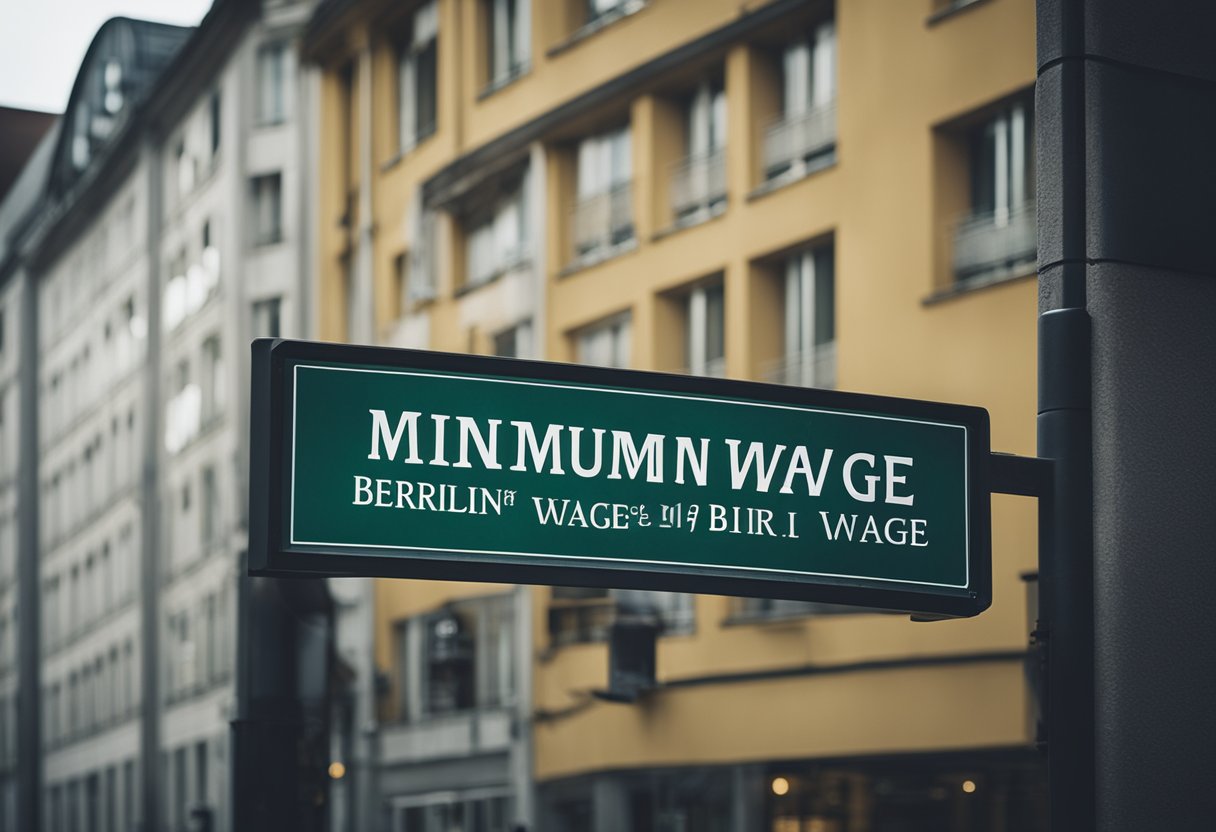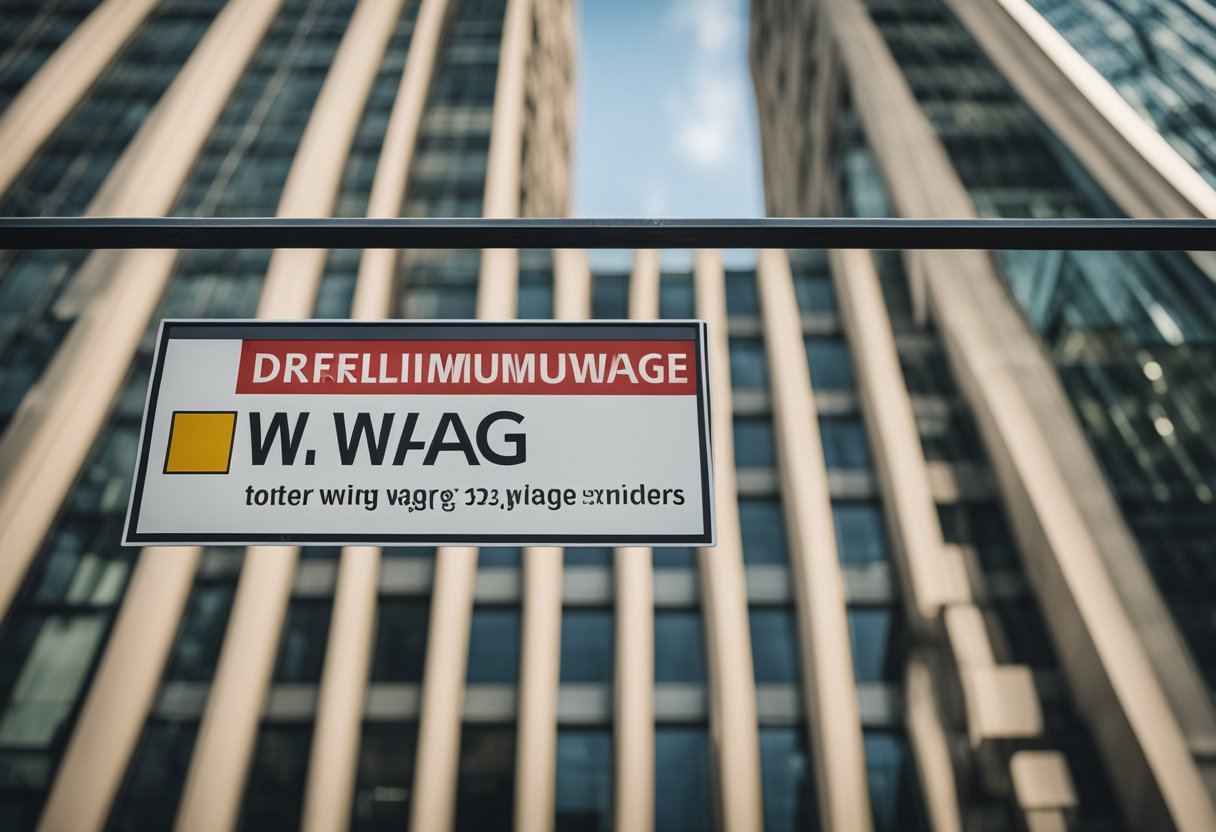In Berlin, Germany, as of January 2024, the statutory minimum wage applies to a diverse workforce including full-time employees, part-time workers, and working students.
It is a legal requirement for employers to pay according to the Berlin minimum wage set by the Government, which was last updated to €12 per hour before taxes as of October 1, 2022. This rate is set at the federal level and thus is consistent across all German states, including Berlin.
Considering the living costs in Berlin, this minimum wage aims to provide a basic standard of living for all workers. For working students, this wage translates to a maximum earning potential that adheres to the standard number of working hours permitted alongside their studies.
In terms of gauging what constitutes a good salary in Berlin, factors such as the industry, profession, and individual living standards play crucial roles.
The median income can often provide a better understanding of what an average worker in Berlin earns, offering a more comprehensive picture of the city’s wage standards beyond the minimum wage threshold.
Berlin Minimum Wage Standards
In Germany, the minimum wage has progressively adjusted to meet the economic and social standards set forth by policymakers and economic advisers. This wage floor applies to nearly all workers across various sectors throughout the nation, including Berlin.
Statutory Minimum Wage
A statutory minimum wage is a legal requirement that applies across Germany. As of January 2024, it stands at €12 per hour. This nationwide floor ensures that every worker receives at least this hourly rate for the work they perform.
In the context of the European Union, Germany’s minimum wage aligns with the economic policies aimed to provide fair employment conditions across member states.
Minimum Wage Commission Role
The Minimum Wage Commission plays a critical role in setting the standard for minimum wages in Germany. Comprising representatives from employers, employees, and the academic realm, the Commission analyzes the labor market and recommends adjustments to the statutory minimum wage.
These periodic adjustments aim to balance cost of living with economic stability, and reflect consensus from diverse sectors of the economy.
Scope and Applicability
The minimum wage in Berlin, Germany, is a standard rate that applies to a broad range of employment situations. This comprehensive scope ensures that most employees receive fair compensation for their work, while also detailing specific regulations for various sectors and types of employment.
Eligible Employees
Virtually all employees in Berlin fall under the remit of the statutory minimum wage, or Mindestlohn, regardless of their age or sector. This includes full-time, part-time, temporary, and marginally employed persons.
Special considerations are given to trainees and interns, who may have different wage requirements based on the structure and terms of their vocational training programs.
Expat and Self-Employed Status
Expatriates working in Berlin are entitled to the minimum wage just like local employees. In contrast, self-employed individuals do not qualify for Mindestlohn as they set their own rates.
However, certain contracts construed as “pseudo self-employment” may be subject to minimum wage laws if an employment relationship is effectively in place.
Sector-Specific Regulations
Some sectors have specific minimum wage regulations that exceed the standard rate. These are often the result of collective bargaining agreements.
Additionally, long-term unemployed persons might be exempt from the minimum wage for a certain period after commencing employment to facilitate their re-entry into the labor market. Employers must comply with these regulations, as they are enforceable across all of Berlin.
Understanding these three aspects of the minimum wage legislation helps clarify who is covered, including any exceptions or variations that might affect different groups of employees, employers, and sectors within the region.
Legal Framework
In Berlin, Germany, the legal infrastructure governing minimum wages involves a combination of national legislation and specific local adjustments. These regulations ensure that employees receive fair compensation for their labor across different sectors and roles.
Minimum Wage Act
The Minimum Wage Act (Mindestlohngesetz) serves as the cornerstone of the minimum wage laws. It outlines the provisions for a statutory minimum wage that applies to nearly all workers.
The Federal Ministry of Labour and Social Affairs bears the responsibility of overseeing these regulations. The minimum wage is subject to periodic reviews by a commission appointed by the ministry, which recommends adjustments based on economic conditions and wage developments.
Labor Law Compliance
Employers are required to comply with the comprehensive labor law, which includes adherence to the stipulated minimum wage laws.
Compliance is critical, as it not only ensures equitable minimum wages but also factors in appropriate taxes and contributions based on the gross minimum wage. Legislation mandates that the payment must meet or exceed the statutory rates, providing employees protection under the law.
Enforcement and Penalties
To enforce the Minimum Wage Act, there are robust measures in place. Enforcement includes thorough inspections and audits by authorities to ensure employers are in strict compliance.
In the event of a violation, the law prescribes penalties, which can include fines or even imprisonment for severe offences. Lawmakers designed these stringent punitive measures to deter non-compliance and protect workers’ rights to fair compensation.
According to recent legislation, Berlin has set an advanced bill establishing a federal state minimum wage of 13 euros per hour for public employees, representing an increase from the former hourly wage of 12.50 euros.
This illustrates the dynamic nature of wage regulation in response to evolving economic circumstances and the cost of living.
Financial Aspects and Calculations
In Berlin, Germany, it is crucial to distinguish between gross earnings and the net wage after deductions. A clear understanding of salary calculations is essential for both employers and employees.
Understanding Gross vs. Net Wage
The gross minimum wage in Berlin is the initial salary amount before any deductions are applied. This figure includes the hourly wage without subtracting taxes or social security contributions.
As of January 2024, the gross minimum wage in Berlin was set at EUR 12.41 per hour. On the other hand, the net wage is the amount that employees receive after deductions like income tax, unemployment insurance, and long-term care insurance have been accounted for on their payslip.
- Gross Minimum Wage: EUR 12.41/hour
- Social Security Contributions: Includes health, pension, unemployment insurance, and long-term care insurance
- Taxes: Depends on the individual’s tax class
Salary Calculations
A salary calculator can be utilized to determine the net wage from the gross salary. Employees are categorized into different tax classes in Germany, impacting the amount of income tax and other deductions. For instance, a single employee without children would fall into tax class 1.
Example Payslip:
| Description | Amount (EUR) |
|---|---|
| Gross Wage | 2000.00 |
| Health Insurance | -150.00 |
| Long-Term Care Insurance | -25.00 |
| Pension Insurance | -185.00 |
| Unemployment Insurance | -30.00 |
| Income Tax | -225.00 |
| Net Wage | 1385.00 |
This table provides a simplified example of a typical monthly payslip in Berlin, showcasing standard deductions to arrive at the net wage.
Working students in Berlin have the benefit of earning up to EUR 450 per month tax-free. They also have lower social security contributions, making part-time work a lucrative option for students.
When considering what constitutes a good salary in Berlin, it around EUR 3,000 to EUR 4,000 net per month is considered comfortable. This range usually accounts for living expenses and provides a decent quality of life.
Social and Economic Implications
With the introduction of a statutory minimum wage in Germany, the social and economic landscape has shifted, reflecting changes in the cost of living, wages across the nation, and disparities across gender and nationality.
Impact on Cost of Living
The minimum wage in Germany plays a significant role in shaping the cost of living, particularly in urban centers like Berlin. Social security contributions, which are mandatory, are partially influenced by wage levels. With Berlin’s cost of living being relatively high, the minimum wage increment is instrumental in supporting workers’ needs in the city.
National Wage Comparison
When comparing wages nationally, Berlin’s minimum wage must be contrasted with the nationwide average salary in Germany as well as with other European countries like Luxembourg, which boasts one of the highest minimum wages.
The Federal Statistical Office of Germany provides contextual data, highlighting regional disparities and the varying economic conditions impacting wages.
Gender and Nationality Factors
Gender and nationality play roles in economic outcomes within Germany’s labor market. There have been ongoing discussions around ensuring a fair wage for all workers, regardless of gender or nationality, to promote equality.
Occupational wages vary, and particular attention is given to industries where discrepancies are prevalent.
Rights and Protections
The workforce in Berlin is shielded by comprehensive legislation that ensures fair labor standards, including health insurance entitlements and avenues for legal recourse. These frameworks are designed to educate employees about their rights and provide protection against exploitation.
Employee Rights and Education
In Berlin, employees are endowed with certain rights such as the entitlement to a minimum wage, which equals to €10.45 per hour as of 2023. Health insurance coverage is a mandatory right for everyone employed in Germany, safeguarding workers’ health and well-being.
Moreover, working students in Berlin can earn up to this minimum threshold without having to pay student health insurance, ensuring they can combine education and employment effectively.
When considering a good salary in Berlin, it is subjective; however, salaries exceeding the minimum wage can offer a more comfortable living standard.
Legal Recourse for Violations
If an employer violates these labor laws, such as undercutting the minimum wage, the employees have the right to pursue legal action against the offending party.
German labor courts serve to reconcile such disputes and enforce the law, demonstrating a robust legal framework available to employees in Berlin.
This dedicated pursuit of upholding employee protections helps sustain an equitable work environment across the city’s diverse industries.
Political and Historical Context
The minimum wage in Berlin, Germany, has been influenced greatly by the interplay of political parties and their policies, as well as the changing economic landscape over time.
Political Parties’ Stance
The Christian Democratic Union (CDU), led by former Chancellor Angela Merkel, traditionally approached the minimum wage with caution, emphasizing the potential impact on employment levels.
In contrast, the Social Democratic Party (SPD), part of the current governing coalition, has been a vigorous proponent of a robust minimum wage.
Labour Minister Hubertus Heil, from the SPD, played a pivotal role in the minimum wage increase to €12 per hour which took effect in October 2022.
The Left Party has also been a vocal advocate for higher wage floors, pushing for measures that would ensure a living wage for all workers.
The Bundestag, Germany’s federal parliament, has seen significant debates on this issue, with the minimum wage policy often being at the center of the discussions.
The political consensus formed in the cabinet has largely shaped the progression of minimum wage legislation.
Historical Wage Evolution
The statutory minimum wage in Germany was first introduced in 2015, which marked a significant shift in German labor policy. Prior to this, wages were largely determined by industry-level collective bargaining agreements.
The initial minimum wage was set below the current level, and since then, it has undergone periodic increases.
The decision to elevate the minimum wage to €12 per hour was a landmark one, affecting over 6 million people by improving their earning capabilities without the anticipated reduction in jobs as raised by critics.
In the context of Berlin’s living standards, a €12 per hour wage reflects efforts to align pay with the city’s cost of living. However, it is worth noting that a “good salary” in Berlin would generally surpass the minimum wage, taking into account the city’s living expenses, where salaries averaging above €3,000 per month are often deemed comfortable.
For working students, the impact of the minimum wage increase is significant, as it boosts their earning potential, although their overall income would naturally be less than full-time employees due to fewer working hours.
Frequently Asked Questions
These questions cover pivotal aspects about the minimum wage in Berlin, providing clarity on hourly earnings, monthly income, tax implications, students’ wages, and comparisons to living standards and other currencies.
How much does one earn on hourly basis with the minimum wage in Berlin?
As of 2023, the minimum wage in Germany is standardized at €12 per hour, which also applies to workers in Berlin. This rate might have changed as adjustments are made periodically.
What is the typical monthly income from minimum wage in Berlin?
A full-time employee working the standard 40-hour workweek at the minimum wage rate could expect a gross monthly income of approximately €2,080 in Berlin. This figure before tax assumes a standard four-week month.
How is the minimum wage in Germany affected by taxation?
The minimum wage in Germany is subject to income tax and social security contributions. The exact rate of taxation varies based on individual circumstances, including income level, marital status, and any allowable deductions.
What is the current minimum wage for students working in Germany?
Students in Germany are also entitled to the national minimum wage of €12 per hour. However, they may have different tax obligations, especially if they are working part-time or during semester breaks.
What constitutes a decent living salary in Berlin?
A decent living salary in Berlin would depend on various factors, including personal living standards and costs. However, reports suggest that a salary of €3,000 to €3,500 per month before taxes is often considered satisfactory for a single individual to cover living expenses in the city.
How can the German minimum wage be converted into US dollars for comparison?
To convert the German minimum wage into US dollars, one would use the current exchange rate. As exchange rates fluctuate, one must check the latest rate for the most accurate conversion.





